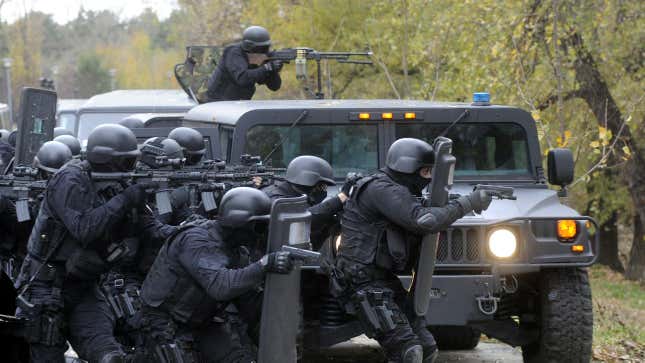
A series of swatting calls that have occurred over several months across the United States have been pinned down to a Telegram user, who claims to have left explosives in locations like high schools using a digitally synthesized voice.
Vice broke the story on the user, who goes by “Torswats” and offers a paid service on the messaging platform Telegram to conduct swatting calls. Swatting refers to the act of lying to law enforcement about a bomb threat or framing someone else in a certain location as having committed a crime or harboring illicit material. For $50, customers can purchase “extreme swattings,” where authorities will often handcuff an alleged suspect and search their house, and for $75, Torswats can apparently close down a school. According to Vice’s report, Torswats accepts cryptocurrency as payment, and will offer returning customers a discount and is willing to negotiate a price for famous targets.
Advertisement
“Hello, I just committed a crime and I want to confess. I placed explosives in a local school,” the voice on a recording of a Torswats call with law enforcement says. The recording was uploaded to Soundcloud by Vice.
Torswats’ voice is digitally generated, but its not immediately clear whether or not this is artificial intelligence, which has been able to emulate human voices so well that it’s putting some voice actors out of work. Vice identified two out of 35 recordings that did not use a digital voice. In the phone call recording published by Vice, Torswats was targeting Hempstead High School in Dubuque, Iowa and the bomb threat was picked up by local media. Additional Torswats targets reportedly included a CBD shop in Florida, a corporate office in Maryland, and residences in Virginia, Massachusetts, Texas, California.

LEGO Star Wars Kits
There are galaxy-class markdowns to be had right now on many of the biggest and best LEGO Star Wars model kits.
Advertisement
Advertisement
“The FBI takes swatting very seriously because it puts innocent people at risk,” Steve Bernd, public affairs at FBI Seattle, told Vice’s Motherboard. Police have been talking about the “swatting” problem for well over a decade and there’s been other instances that have made headlines recently. Just last month, federal law enforcement indicted a Seattle man on 10 counts of extortion and threats for placing more than 20 swat calls to police. The man would allegedly livestream these calls to a select Discord community.
Services Marketplace – Listings, Bookings & Reviews